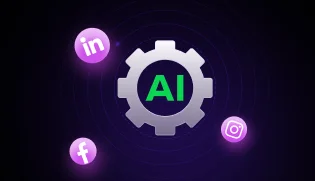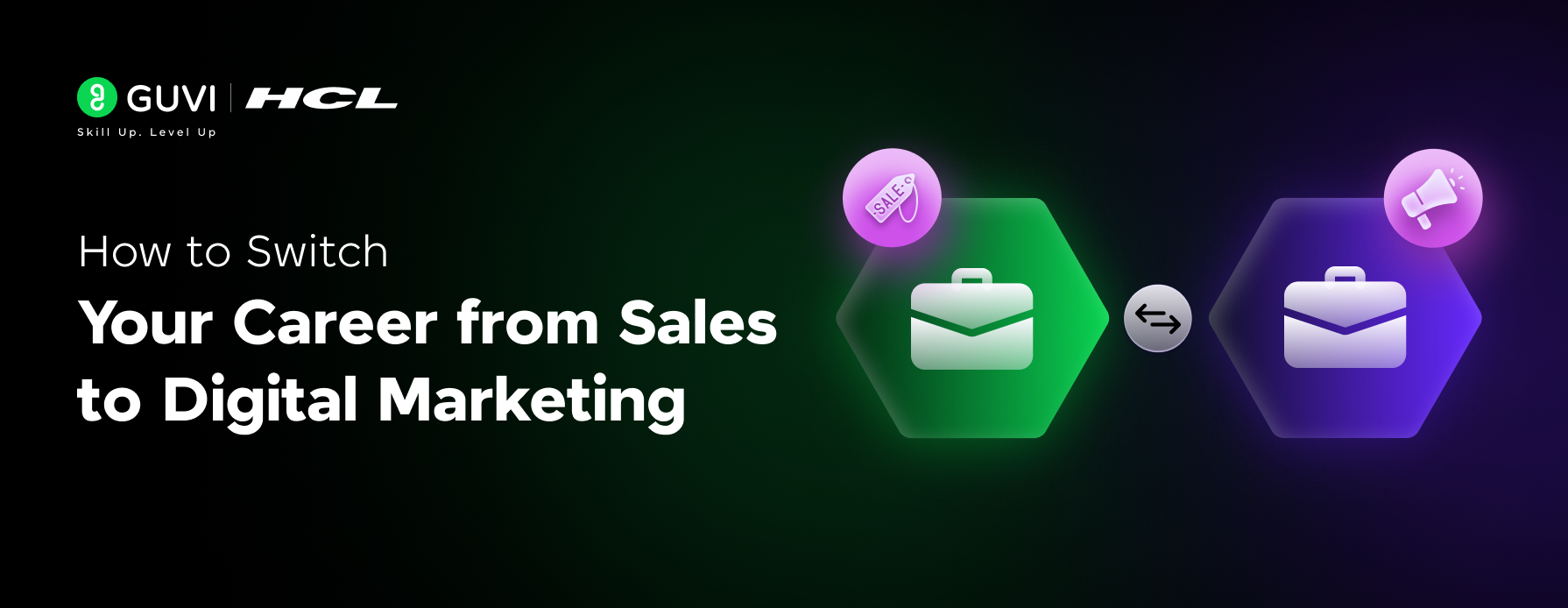
10 Outstanding Marketing Management Case Studies from India
Jun 06, 2025 7 Min Read 69519 Views
(Last Updated)
Marketing management is crucial for ensuring a business’s success. This article highlights 10 outstanding marketing management case studies from India, where famous brands overcame serious challenges and emerged on top.
This included effective market segmentation, creative digital marketing campaigns, hard-hitting customer engagement strategies, and much more. Each case study is a valuable learning opportunity about the power of strategic decision-making and operational excellence to thrive in India’s competitive business environment.
Table of contents
- 1) GUVI Geek Pvt Ltd - Empowering India Through Vernacular Education
- Challenges
- Solutions Implemented
- Business Outcome
- 2) Reliance Jio - Redefining Connectivity in India
- Challenges
- Solutions Implemented
- Business Outcome
- 3) CRED - Building a Fintech Brand through Creative Marketing
- Challenges
- Solutions Implemented
- Business Outcome
- 4) Zomato - Mastering Hyperlocal Marketing
- Challenges
- Solutions Implemented
- Business Outcome
- 5) Myntra - Personalizing Fashion Retail
- Challenges
- Solutions Implemented
- Business Outcome
- 6) Tata Motors - The Nano Initiative
- Challenges
- Solutions Implemented
- Business Outcome
- 7) Paytm - Digital Wallet Success
- Challenges
- Solutions Implemented
- Business Outcome
- 8) Ola Cabs - Driving Through Competitive Roads
- Challenges
- Solutions Implemented
- Business Outcome
- 9) Patanjali - Leveraging Cultural Connection in Marketing
- Challenges
- Solutions Implemented
- Business Outcome
- 10) Swiggy - Delivering Success with Agile Marketing
- Challenges
- Solutions Implemented
- Business Outcome
- Conclusion
- Frequently asked questions
- What are the key elements of effective marketing management?
- What role does technology play in modern marketing management?
- How can small businesses implement effective marketing management practices?
- What are some common challenges in marketing management?
- How important is cultural sensitivity in marketing?
1) GUVI Geek Pvt Ltd – Empowering India Through Vernacular Education

GUVI Geek Pvt Ltd, supported by prestigious institutions such as IIT-M and IIM-A, has dramatically impacted the Indian EdTech industry. GUVI made education inclusive for everyone across the nation.
Challenges
Despite various big players and the rising demand for tech skills, a large portion of India’s population needed help accessing quality education. This included language barriers and high costs.
Solutions Implemented
GUVI addressed these challenges in the following ways:
- Vernacular language courses: GUVI eliminated the language barrier by offering tech courses in regional languages, making learning effortless.
- Affordable pricing models: GUVI designed their pricing to be accessible, allowing a wider range of students to enroll and benefit from their courses.
- Partnerships with NSDC and TSSC: Collaborations with these organizations have helped GUVI extend its reach and add formal recognition to its courses, boosting its credibility and that of those undergoing its courses and seeking good job placements.
Business Outcome
GUVI has experienced substantial growth in user engagement and course completion rates thanks to these strategic solutions. Their approach has not only made tech education more democratic in India but also contributed to considerable business growth, with thousands of students securing employment in leading tech companies across the country.
Before we move to the next case study, consider enrolling in GUVI’s Business Analytics and Digital Marketing Course to gain a deeper understanding of marketing and business analytics concepts. This program lets you gain practical experience by developing real-world projects and covering technologies, including Power BI, Excel, SQL, Tableau, Data Visualization, etc.
Additionally, if you would like to explore Marketing Research Techniques through a Self-paced course, try GUVI’s Marketing Research Techniques certification course.
2) Reliance Jio – Redefining Connectivity in India

Reliance Jio burst onto the Indian telecommunications scene in 2016, quickly becoming a game-changer with its unique marketing strategies and disruptive business model.
By providing high-speed internet at unprecedentedly low prices, Jio altered how Indians access the internet and reshaped the entire telecom service landscape in the country.
Challenges
Before Jio’s entry, the Indian telecom market was fiercely competitive and controlled by established players charging high prices for internet services. Data consumption was expensive, and the availability of 4G technology could have been more extensive.
For Jio, the challenge was breaking through these barriers to establish itself and achieve broad market adoption.
Solutions Implemented
Jio implemented several key strategies to address these challenges:
- Aggressive pricing: Jio launched with a compelling offer of free internet and voice calls for the first six months, radically shifting consumer expectations around telecom costs.
- Massive infrastructure investment: They rapidly deployed extensive 4G coverage to ensure high-speed internet access, even in remote areas of the country.
- Bundling services: Jio also enhanced value by offering bundled services that included media streaming, live TV, and music apps, enriching the core telecom offerings.
Business Outcome
The results of Jio’s strategies are a prime example of effective marketing management. In just a few years, Jio emerged as the largest telecom operator in India, amassing over 400 million subscribers. Its pioneering approach led to a dramatic decrease in data costs while spurring a substantial uptick in data usage across India, catalyzing a digital transformation in both consumer and business sectors.
Also Read: 6 Reasons Business Analytics Makes Digital Marketing Powerful
3) CRED – Building a Fintech Brand through Creative Marketing

CRED, a Bangalore-based fintech startup founded by Kunal Shah, quickly carved out a niche in the competitive fintech space with its creative business model. By targeting credit card users with good credit scores, CRED offered rewards for paying credit card bills through its app, setting itself apart from other apps.
Challenges
CRED faced the substantial challenge of establishing trust and attracting a high-value customer base in a market wary of data privacy and financial security issues. Additionally, engaging a demographic accustomed to traditional banking services demanded novel marketing strategies.
Solutions Implemented
CRED tackled these challenges with several strategic initiatives:
- Selective customer base: By focusing on users with high credit scores, CRED ensured a reliable user base, making the platform attractive to premium brands and partners.
- Engaging rewards system: CRED introduced a rewards system that incentivized timely credit card bill payments, transforming a routine chore into a rewarding experience.
- High-impact marketing campaigns: CRED’s campaigns were designed to generate buzz and enhance brand recognition through viral marketing techniques and celebrity endorsements.
Business Outcome
The effectiveness of CRED’s strategies is evident in its impressive growth. Thanks to its innovative rewards system, the app has witnessed exponential increases in user numbers and engagement levels. By rewarding financial responsibility, CRED has boosted its brand value and cultivated a dedicated customer base, distinguishing itself in the bustling fintech market.
This case stands out in the marketing management case studies, showing the power of creative marketing in building a successful fintech brand.
Also Explore: Top 7 Reasons Why You Should Learn Digital Marketing
4) Zomato – Mastering Hyperlocal Marketing

Zomato, a dominant player in India’s food delivery and restaurant discovery sector, has harnessed data-driven strategies to customize its services and fortify its market position. By leveraging analytics, Zomato has aligned its offerings with local preferences and boosted customer satisfaction and loyalty.
Challenges
The food delivery market is intensely competitive, crowded with numerous entities contending for dominance. Zomato had to sustain its growth trajectory while enhancing profitability. Moreover, retaining customers and maintaining their engagement was crucial in a market distinguished by low switching costs.
Solutions Implemented
To steer through these challenges, Zomato adopted the following approaches:
- Data-driven personalization: The company greatly used customer data to provide personalized restaurant recommendations and promotions suited to individual interests.
- Dynamic pricing models: Zomato employed AI-driven pricing strategies that adjusted costs dynamically based on demand fluctuations during peak and off-peak periods.
- Community engagement initiatives: By engaging with social media platforms and encouraging user-generated content, Zomato built a vibrant community centered around unique food experiences.
Business Outcome
Zomato’s strategies produced remarkable results. The platform experienced an uptick in order frequency and improved customer retention rates. Zomato refined its operational and marketing strategy through data-driven insights, improving profit margins and heightened user satisfaction. This case exemplifies effective hyperlocal marketing management and demonstrates how tailored approaches can lead to substantial gains in a competitive industry.
Must Explore 16 Types of Digital Marketing
5) Myntra – Personalizing Fashion Retail

Myntra, a frontrunner in India’s online fashion retail sector, distinguishes itself by employing cutting-edge technology to deliver a highly personalized shopping experience. Integrating AI and machine learning enables Myntra to cater to customers’ unique tastes, enhancing satisfaction and driving sales.
Challenges
Like the food delivery market, the online fashion landscape is fiercely competitive, with consumers not only looking for top-quality products but also demanding a shopping experience that aligns closely with their preferences. Myntra faced the challenge of standing out from other e-commerce platforms by increasing user engagement and personalization.
Solutions Implemented
Myntra implemented many advanced marketing management solutions to meet these challenges:
- Advanced recommendation engines: Using AI, Myntra analyzes browsing and purchase histories to tailor product recommendations for each shopper.
- Virtual dressing rooms: The introduction of augmented reality (AR) technology allows customers to try on clothes virtually, limiting the uncertainties associated with online apparel shopping.
- Dynamic marketing campaigns: Myntra uses customer data to prepare targeted marketing initiatives that resonate with individual preferences and adapt to seasonal trends.
Business Outcome
Myntra’s personalized strategies have greatly improved customer retention rates and raised average order values. Adopting AI and AR technologies enhances the consumer shopping experience and solidifies Myntra’s position as a technologically advanced player in the fashion industry. This case study illustrates the effectiveness of personalization in Indian marketing management, making it a pivotal example among marketing management case studies.
Also explore: Business Analytics Skills You Should Know
6) Tata Motors – The Nano Initiative

Tata Motors, an influential force in the Indian automotive sector, launched the Tata Nano, branding it as the world’s cheapest car to make car ownership feasible for every Indian family. This initiative was viewed as a groundbreaking step in automotive marketing, aiming to transform the industry landscape.
Challenges
The Tata Nano encountered several obstacles, notably issues with public perception concerning its safety and quality due to the low cost and logistical challenges in its distribution and manufacturing processes.
Solutions Implemented
Tata Motors deployed several innovative solutions to address these issues:
- Innovative manufacturing solutions: They refined production processes to minimize costs while maintaining quality standards.
- Strategic pricing: The low pricing was central to attracting families who previously could only afford two-wheelers.
- Robust safety campaigns: In response to concerns about quality, Tata Motors initiated campaigns highlighting the Nano’s safety and reliability features.
Business Outcome
Though Tata Nano initially captured global attention and sparked interest, its long-term success was mixed. It became a seminal case study on the complexities of consumer perception and the market’s readiness for radically priced products.
This experience gave Tata Motors important insights into market research and consumer expectations, shaping their future strategies. This case highlights the difficulties ingrained in Indian marketing management and is a necessary inclusion in discussions of marketing management case studies from India.
Must-Know About Top Digital Marketing Trends
7) Paytm – Digital Wallet Success

Paytm has dramatically transformed the digital payments landscape in India by evolving from a simple mobile wallet to an expansive financial services platform, securing its status as a household name.
Challenges
The major hurdle for Paytm was establishing trust and achieving widespread adoption in a predominantly cash-based market with relatively low digital financial literacy.
Solutions Implemented
Paytm adeptly managed these challenges in the following ways:
- Demonetization opportunity: Capitalizing on India’s 2016 demonetization, which spurred a pressing need for digital payment solutions, Paytm launched aggressive marketing campaigns to position itself as a convenient cash alternative.
- User-friendly interface: Paytm developed an intuitive interface that catered to both tech-savvy and novice users, significantly expanding its user base.
- Strategic partnerships: By developing collaborations with diverse service providers and retailers, Paytm ensured its wallet’s widespread acceptance, increasing its utility and appeal.
Business Outcome
The effectiveness of Paytm’s strategies is obvious from the dramatic surge in user adoption, with millions of new users joining the platform in a short time. Paytm cemented its leadership in India’s fintech industry, diversifying its offerings to include banking, investments, and insurance services. This case study exemplifies marketing management excellence, highlighting how innovative approaches can drive success in the dynamic digital payments market.
Find Out Digital Marketing Best Practices
8) Ola Cabs – Driving Through Competitive Roads

Ola Cabs, a prominent figure in India’s ride-sharing landscape, has successfully countered the intense competition from global giants like Uber by prioritizing local preferences and needs.
Challenges
Ola grappled with several challenges, including fierce rivalry, regulatory obstacles, and the imperative to uphold service quality while expanding operations across India’s diverse urban environments.
Solutions Implemented
Ola addressed these issues with innovative and localized strategies:
- Localization of services: Ola customized its services to meet local demands in various cities, introducing modes like auto-rickshaws and bikes alongside traditional cabs.
- Dynamic pricing and promotions: The company adopted dynamic pricing models to balance demand during peak times and rolled out frequent promotions to maintain customer loyalty.
- Technology integration: Ola enhanced the riding experience by including advanced navigation and safety features, improving both driver and passenger satisfaction.
Business Outcome
These strategic measures have strengthened Ola’s position in the Indian market, allowing it to sustain a strong growth trajectory amidst extreme competition. Additionally, the company has diversified into related sectors like food delivery and financial services, capitalizing on its expansive customer base.
Also read: Top Growth Marketing Strategies
9) Patanjali – Leveraging Cultural Connection in Marketing

Patanjali Ayurveda Limited, co-founded by Baba Ramdev, has profoundly impacted the Indian FMCG sector by promoting Ayurvedic products as healthier and more ethical alternatives. The company has effectively harnessed India’s rich cultural heritage and traditional wellness practices to market its products.
Challenges
Upon entering the market, Patanjali faced stiff competition from multinational corporations with well-established brands and substantial marketing resources. The primary challenge was differentiating their offerings in a saturated market and persuading consumers to switch from trusted FMCG brands to newcomers advocating traditional remedies.
Solutions Implemented
Patanjali’s impactful marketing strategies included:
- Cultural branding: Patanjali positioned its products around the principles of Ayurveda and natural wellness, tapping into Indian traditions and cultural pride to appeal to consumers.
- Endorsements and trust building: The company leveraged the credibility of Baba Ramdev, a renowned yoga guru in India, to build trust and authenticate the health benefits of their products.
- Aggressive pricing strategy: Patanjali sets competitive prices for its products, making them accessible to a broader demographic and enabling direct competition with established FMCG brands on price.
Business Outcome
Patanjali’s strategic approach resulted in rapid brand growth and significant market penetration. The company successfully captured substantial market shares in various product categories, including healthcare, personal care, and food items.
Patanjali’s success prompted many existing FMCG companies to reevaluate their product lines and introduce their own natural and Ayurvedic products, validating the effectiveness of Patanjali’s market entry and branding strategy. This case study is a prime example of how leveraging cultural connections can powerfully impact marketing management and drive success in competitive industries.
Also Read: 10 Best Digital Marketing Projects
10) Swiggy – Delivering Success with Agile Marketing

Like Zomato, Swiggy has become celebrated in India’s competitive food delivery sector by emphasizing customer satisfaction and utilizing advanced technology to boost service efficiency.
Challenges
In a market where speed, accuracy, and customer service are paramount, Swiggy needed to build a dependable delivery network. The company also faced the dual challenge of managing logistical difficulties and ensuring satisfaction among partner restaurants.
Solutions Implemented
Swiggy implemented a range of strategic solutions to address these challenges:
- Advanced logistics algorithms: Swiggy utilized sophisticated algorithms to enhance delivery routes and timings, improving efficiency and shortening customer wait times.
- Customer-centric marketing: The company concentrated on personalized promotions and loyalty programs to strengthen user engagement and retention.
- Partnership and support for restaurants: Swiggy provided its restaurant partners with essential tools and technology to help them effectively manage orders, thereby increasing their performance and satisfaction.
Business Outcome
Swiggy’s strategic initiatives have solidified its reputation as one of India’s most reliable and efficient food delivery services. The company has seen significant growth in order volume and an expansion in its network of restaurant partners. Swiggy’s dedication to leveraging technology and prioritizing customer service has enabled it to maintain a leading position in the market.
Kickstart your career by enrolling in GUVI’s Business Analytics and Digital Marketing Course where you will master technologies including Power BI, Excel, SQL, Tableau, and Data Visualization, and build interesting real-life business analytics projects.
Alternatively, if you want to explore Marketing Research Techniques through a Self-paced course, try GUVI’s Marketing Research Techniques certification course.
Conclusion
Each of these marketing management case studies underscores the profound impact of strategic innovation and market adaptability. The narratives of companies like Patanjali, which connected culturally to carve out market share, and Paytm, which transformed challenges into opportunities during demonetization, exemplify the power of context-driven marketing in a diverse marketplace.
More than just being guides on overcoming complex business challenges, these case studies highlight the importance of understanding consumer behavior, leveraging local insights, and the role of technology in shaping business success.
Also, Find Out Top Product-Based Companies for Digital Marketers
Frequently asked questions
Effective marketing management includes strategic planning, customer insight, creative problem-solving, and data-driven decision-making. Successful marketers also prioritize adaptability to quickly respond to market changes and technological advancements.
Technology is central to modern marketing management. It allows businesses to accumulate and analyze vast amounts of customer data, automate and optimize marketing campaigns, and provide personalized customer experiences at scale.
AI and machine learning tools are increasingly indispensable for predictive analytics and customer segmentation.
Small businesses can implement effective marketing management by understanding their niche market, leveraging local SEO, engaging with customers on social media, and using cost-effective digital marketing tools to track and measure their marketing efforts.
Common challenges in marketing management include:
– Maintaining consistent brand messaging across multiple channels.
– Measuring marketing ROI.
– Adapting to rapid technological changes.
– Effectively targeting increasingly diverse consumer bases.
Cultural sensitivity ensures marketing messages are appropriate and resonant with diverse audience segments. Missteps can damage a brand and cause customers to lose trust, while culturally attuned marketing can enhance brand reputation and customer loyalty.































Great Blog
Thankyou for this information.
Even taste also matters ,and convince of customers